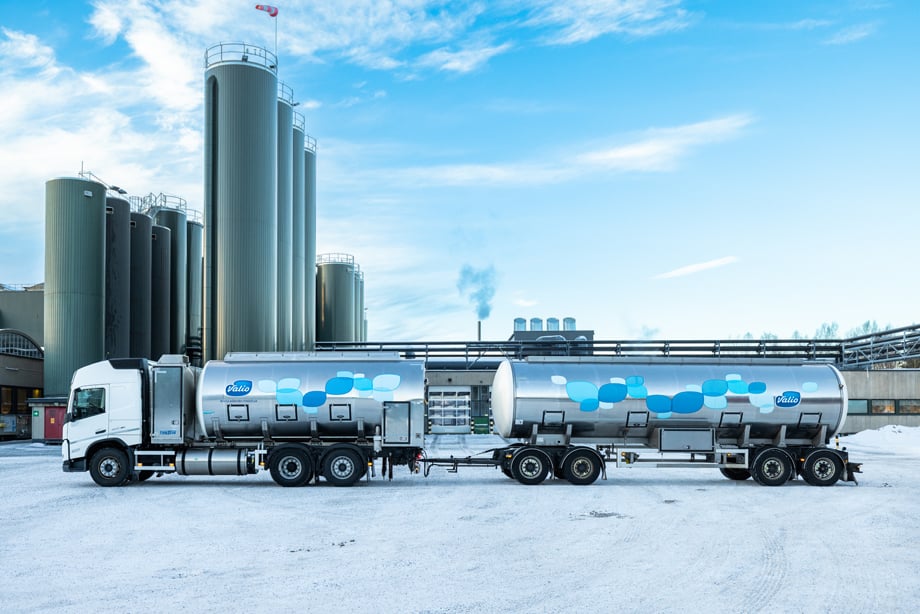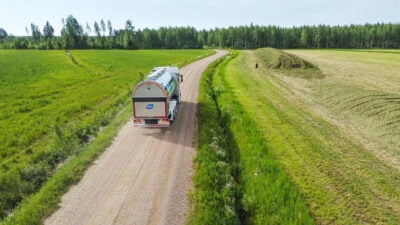Suomen Lantakaasu Oy, the joint venture of Valio and energy company St1, is planning to build Finland’s biggest biogas production plant in in Upper Savo, Finland. The Ministry of Employment and the Economy has granted EUR 19.2 million in funding for construction of Suomen Lantakaasu Oy’s biogas and liquefaction plant. The biogas plant will use dairy farm manure and agricultural by-products to produce renewable, liquefied biogas for use as transport fuel.
Suomen Lantakaasu Oy aims to produce a total of 1 TWh of renewable transport fuel, which corresponds to a quarter of Finland’s biogas target by 2030. St1 will distribute the biogas through its own nationwide network of fuelling stations for heavy-duty vehicles. The planned annual production capacity of the first biogas production plant is 125 GWh, and the goal is for the plant to be operational by 2026.
The Ministry of Employment and the Economy’s funding decision is conditional, as it is subject to approval by the European Commission. The funding will come from Europe’s RRF Recovery and Resilience Facility.
The plant project has progressed steadily during the year, and with the award of the investment grant, the next step will be to start tendering for the construction of the plant and a more detailed plant design process. The project will advance to the investment decision phase once the environmental and construction permits have been issued.
At the moment, agricultural companies in the Upper Savo region are being pursued through letters of intent. The manure and agro-biomass they generate can be used to produce liquefied biogas.
“We have been pleased with the positive reception in Upper Savo regarding our biogas plant plans. The farms in the region are interested in the project and, through the letters of intent, we have secured more than half of the manure feedstock required for the central plant. However, we still need more agricultural businesses in the region to become agro-biomass suppliers. There has also been interest in the areas around the potential satellite plants, and next year we will start signing these letters of intent. The goal is that the hybrid plant in Upper Savo will reach hundreds of farms,” says Director Leena Helminen, who is responsible for biogas business development at Valio.
When realised, the biogas plant will bring significant investments, tax revenue and new economic activity to Upper Savo. The plant complex will provide employment, both directly and indirectly, e.g. to logistics operators in the region.
The targeted production capacity of 1TWh would correspond to 100 million litres of traditional diesel and the production plant in Upper Savo would correspond to 12 million litres of diesel fuel. Thus, the biogas production will reduce food production and transport emissions. The biogas value chain also efficiently recycles nutrients and decreases nutrient run-off into water systems.
Adding to the interest for farms is the positive impact biogas production will have on farm profitability, as well as the measures improving the nutrient cycle.
Biogas has the potential to grow its market share as a fuel for heavy transport
Biogas produced from manure creates significant climate benefits and strengthens Finland’s energy and fuel self-sufficiency. Biogas has all the potential to quickly grow its market share as a fuel for heavy transport.
“Market growth will enable the production projects and, at the same time, will increase Finland’s energy self-sufficiency in the transition to a low-carbon energy system. Biogas technology makes it possible to produce new renewable fuel for the market by utilising raw materials that would otherwise not be recovered,” says Matti Oksanen, Director of St1’s Gas Business.
Biogas production is part of Valio’s climate programme aiming to cut milk’s carbon footprint to zero by 2035. Biogas also plays an important role in St1’s energy transition, and the company has invested heavily in biogas operations in the Nordic countries in recent years.
Finland’s biggest biogas plant
Suomen Lantakaasu’s plant, which is been planned for Upper Savo is a so-called hybrid plant. This means that there is one industrial-scale, centralised liquefied biogas production plant in Kiuruvesi and smaller satellite biogas plants in clusters of several farms elsewhere in the Upper Savo region
This will keep the biogas feedstock transport distances as short as possible. Suomen Lantakaasu will collect manure from farms and will provide the farms with the bio-fertiliser generated in the production of the biogas. The farm’s nitrogen fertiliser cost will decrease because the amount of soluble nitrogen in bio-fertiliser is up to 20-30 per cent higher than in manure.




